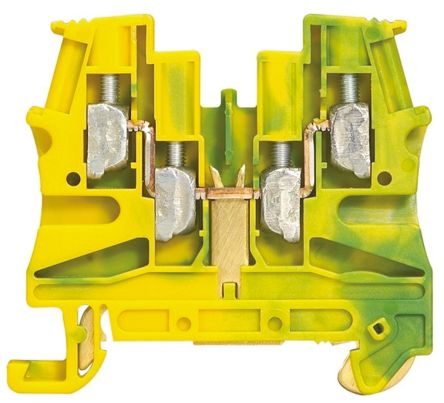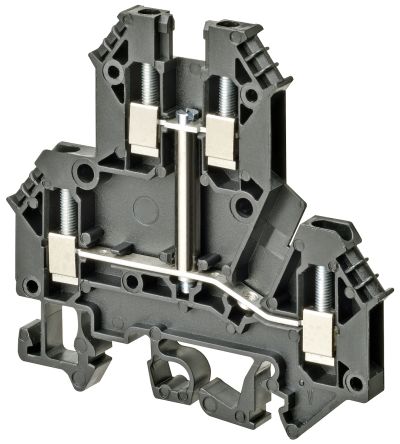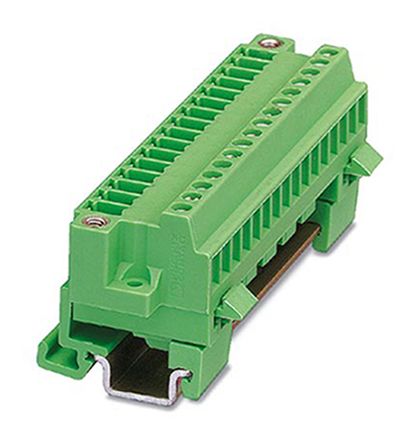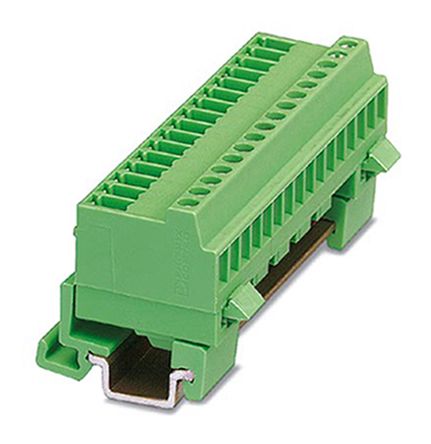- Automation & Control Gear
- Cables & Wires
- Enclosures & Server Racks
- Fuses & Circuit Breakers
- HVAC, Fans & Thermal Management
- Lighting
- Relays & Signal Conditioning
- Switches
- Batteries & Chargers
- Connectors
- Displays & Optoelectronics
- ESD Control, Cleanroom & PCB Prototyping
- Passive Components
- Power Supplies & Transformers
- Raspberry Pi, Arduino, ROCK, STEM Education & Development Tools
- Semiconductors
DIN Rail Terminal Blocks
DIN rail terminal blocks are used to protect electrical systems against overcurrent and short-circuiting. They clip onto a DIN rail, which is a standard-size metal rail on which terminals are mounted in a control cabinet.
Furthermore, DIN rail terminal blocks streamline the organization of control panels and enhance safety, proving essential to the reliability of electrical infrastructures in the Philippines.
How Do DIN Rail Terminal Blocks Work?
DIN rail terminals are made from plastic, as this insulates the electrical current running through the terminal. This ensures safety and functionality across the two main terminal block DIN rail types: fused and non-fused, each designed to support specific electrical connection needs.
- Fused Terminal Blocks: Often have a hinged section containing the fuse, which can be opened up to stop the flow of electricity. Some are fitted with an LED-blown fuse indicator to let you know when the fuse needs changing.
- Non-fused Terminal Blocks: These blocks offer a reliable connection point without built-in fuse protection. They may be color-coded to indicate the acceptable current rating for the wires being connected. This makes them suitable for situations where overcurrent protection is already provided elsewhere in the circuit, such as by circuit breakers.
Both types are typically installed on a DIN rail mount terminal block, which allows for an organized and secure setup in control panels. The wiring in these blocks is secured by DIN rail terminal block connectors, ensuring reliable and uninterrupted electricity flow.
What Are the Advantages of DIN Rail Terminal Blocks?
Fused DIN rail terminal blocks are widely used in industry and offer more protection from overcurrent than non-fused DIN rail terminals. They are usually used to protect sensors and relays.
However, both fused and non-fused can be used for applications such as:
- Energy management
- Power supplies
- Lighting controllers
- Telecommunications
- Building management systems
- Industrial and civil electrical installations
- Heating and air conditioning controls
Beyond their specific applications, DIN rail terminal blocks enhance the efficiency and safety of electrical installations. Thanks to their ease of installation and organizational benefits, these blocks help reduce wiring errors and save valuable space in crowded control cabinets.
Moreover, the standardized DIN rail terminal block sizes fit seamlessly into various setups, promoting better space utilization. At the same time, the flexibility of DIN-mounted terminal block systems supports extensive customization with a range of accessories, enabling precise solutions tailored to specific operational needs.
Furthermore, these terminal blocks simplify maintenance, ensuring that upgrades or replacements can be conducted swiftly and without disrupting the entire system.
Applications of DIN Rail Terminal Blocks
DIN rail terminal blocks in the Philippines are widely used in various sectors to ensure efficient electrical connections. This includes:
- Industrial and Civil Electrical Installations: Organized and secure wiring is essential in these settings. Terminal blocks keep wires neatly aligned and firmly connected, preventing loose connections and electrical faults.
- Energy Management and Power Supplies: By securing connections tightly, DIN rail terminal blocks minimize energy loss and ensure efficient power distribution. This reliability is critical for continuous operation, reducing downtime, and allowing for precise energy monitoring and management.
- Lighting Controllers, Telecommunications, and Building Management Systems: Terminal blocks ensure dependable connections that can handle constant loads and frequent switching. This reliability maintains uninterrupted service and operational efficiency, preventing disruptions in critical systems.
- Heating and Air Conditioning Controls: DIN rail terminal blocks manage various control signals by providing secure and organized connections for sensors, thermostats, and control units. This ensures accurate signal transmission, allowing precise temperature regulation and system responses. By maintaining stable connections, these blocks help improve energy efficiency and system performance, providing comfortable and consistent climate control.
Choosing the Right DIN Rail Terminal Block
Selecting the right DIN rail terminal block types involves considering several critical factors. Here's a breakdown of what to look for:
- Current and Voltage Rating: Ensure your terminal block matches your system’s current and voltage requirements. Proper matching is vital to handle the electrical load without risks of overheating, safeguarding your installation against potential failures.
- Type of Connection: Choose between screw-type connections for durable, secure holds in environments with vibrations or spring-loaded connections for easier and quicker installation and maintenance in frequently altered systems.
- Wire Size: Ensure that the terminal block can accommodate the size of the wires you plan to use. Using a terminal block that fits the wire gauge correctly is crucial for establishing a secure and reliable connection.
- Environment Conditions: Use terminal blocks made from materials suited to specific environmental conditions. For installations in humid or coastal areas of the Philippines, corrosion-resistant blocks are recommended to ensure longevity and prevent degradation.
- Space and Configuration: Evaluate your setup’s available space and configuration to find the most suitable terminal blocks. Modular designs are particularly beneficial in tight spaces, allowing for better organization and easier maintenance.
- Safety and Compliance Standards: Select terminal blocks that comply with the Philippine Electrical Blog (PEC) requirements. To ensure compliance, look for products labeled as PEC-certified or ask suppliers for certification details.
- Accessories and Additional Features: Look for terminal blocks that come with helpful accessories and features such as marking strips, end brackets, and test ports. These can significantly enhance functionality, ease maintenance activities, and improve system management.
- Brand and Manufacturer Support: Choose reputable DIN rail terminal block manufacturers or suppliers in the Philippines with proven track records and who offer valuable resources like technical assistance and product warranties.
Buy DIN Rail Terminals from RS Philippines
Ensuring your electrical systems are safe and efficient starts with high-quality DIN rail terminal blocks. At RS Philippines, we offer a comprehensive selection at competitive prices.
Browse our range of DIN rail terminal connectors today and contact our support team for detailed inquiries and further assistance.




